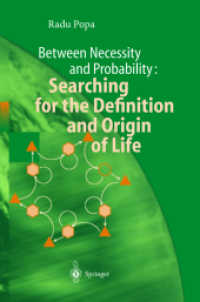- ホーム
- > 洋書
- > 英文書
- > Computer / General
Full Description
This book focuses on design of work from the human-factors (HF) perspective. In the approach referred to as Core-Task Design (CTD), work is considered practice, composed of human actors, the physical and social environment, and the tools used for reaching the actors' objectives. This book begins with consideration of an industrial case, the modernization of a nuclear power plant automation system, and the related human-system interfaces in the control room. This case illustrates generic design dilemmas that invite one to revisit human-factors research methodology: Human factors should adopt practice as a new unit of analysis and should accept intervention as an inherent feature of its methodology. These suggestions are put into practice in the CTD approach, according to which three general design functions are performed, those being: • understand-to-generalize—empirical analysis of the work at hand, • foresee-the-promise—creation of concepts for future work, and • intervene-to-develop—participatory development and design of work. For fulfillment fulfillment of each of the design functions, several CTD methods are introduced. The methods are aimed at modeling the core task and analyzing how the actors actually take the core task features into account in order to achieve balance between potentially conflicting demands in action. Thereby, new understanding of the core task is acquired. Further methods focus on projecting the roles and functionality of technologies in the future work and on implementing changes to the work. Specific studies of the nuclear power plant's control-room renewal constitute an example demonstrating a core task and the associated methods. We argue that the CTD approach offers clear utility for the design of future technology, work, and everyday services and environments. CTD utilizes achievements of practice theory in the social sciences to generate a creative synthesis of Cognitive Work Analysis, semiotic analysis of practice, and the cultural-historical theory of activity. Core-Task Design facilitates dialogue among human-factors experts, design engineers, and end users in their joint development of work. The intended audience of this book is students, researchers, and practitioners of human factors, industrial art and design, and instrumentation and control-system design. Table of Contents: Acknowledgments / Preface / Introduction / Core-Task Design Methodology / Understandings: How to Generalize from Empirical Enquiry about Actual Work / Foreseeing: How to Uncover the Promise of Solutions for Future Work / Intervening: How to Develop the Work System / Core-Task Deign in Broader Perspective / Bibliography / Author Biographies
Contents
Acknowledgments.- Preface.- Introduction.- Core-Task Design Methodology.- Understandings: How to Generalize from Empirical Enquiry about Actual Work.- Foreseeing: How to Uncover the Promise of Solutions for Future Work.- Intervening: How to Develop the Work System.- Core-Task Deign in Broader Perspective.- Bibliography.- Author Biographies.







